
Candidates for the controversial 2014 Delhi Judicial Service (DJS) exam have painstakingly cross-referenced lists of judges’ offspring and others close to Delhi high court judges, received a surprising RTI response, and established that 64 judges who had passed or topped judicial services exams in other states, failed in last year's DJS exam outright.
After long delays in publication of results, the Delhi Judicial Service examinations had continued attracting controversy when only 15 candidates were shortlisted despite 80 listed vacancies, as reported by Legally India after the October 2014 results were announced in May.
Out of the 15 shortlisted candidates, two were children of sitting judges of the Delhi high court, while two were former research assistants of one Delhi high court judge, according to several candidates’ research.
While it was possible that this could simply be explained by judges’ children being better-versed in law and previous exams, admitted one candidate, he said that it was just one of several serious question marks hovering over the results.
On 14 May, advocate Prashant Bhushan wrote a four-page letter to the Delhi high court questioning the results (click here to read), concluding with:
This kind of selection process will further demotivate several other meritorious students of good law schools from choosing judicial services as their career option. The students with good academic records would never appear in the exams having such unreasonable selection method and especially when they are not taking place at regular intervals.
On 18 June, Union law minister Sadananda Gowda wrote a letter to the chief justice of the Delhi high court, claiming that he had heard allegations of “corruption, favouritism and nepotism” in the DJS exam.
Anonymity not guaranteed?
One Delhi Judicial Service examination candidate who inspected their answer sheet told Legally India that their roll number, name and signature were still on the answer sheet when they examined it, implying that the anonymity of candidates was not maintained in the examining process.
The candidate, who did not wish to be named, was one of the top ten rank holders in the prelims examination, but did not even get passing marks in the mains paper.
After the results were announced last month, several candidates had asked to inspect their answer sheet by filing an RTI and were subsequently shown a photocopy of their checked answer sheet in the high court premises.
The candidate who wished to remain anonymous said that in almost all papers the long form answers were awarded unbelievably low marks. An English essay was marked 3 out of 40 while two long form legal application-section answers received marks of 0 out of 40.
“It is nearly impossible to get zero in a long descriptive answer. And I had written the exact judgment, the names of the judges, the citations, everything. There was no underlining by the examiner, no indications or marking or remarks, just a zero after five pages of my answer. And I distinctly remember that my roll number, name and signature were present on every answer sheet.”
Click to enlarge pages 2-4 of candidates who failed the DJS but passed other judicial services exams
Judicial exam successes elsewhere did not translate to Delhi 64 times
DJS aspirants have also compiled a list of 64 candidates who had qualified the judiciary examination in 11 other states that most recently held judicial exams, but who did not obtain the qualifying marks in the Delhi exam.
This includes 10 candidates who had obtained the first or second rank in states like Gujarat, Haryana, Punjab, UP, Uttarakhand, Himachal Pradesh, Odisha and Rajasthan, as well as three candidates who had qualified to become judges in more than one state.
The list was compiled by cross-referencing the names of candidates who has appeared in the DJS mains exam with list of successful candidates from the judiciary exams of 11 states: Odisha, Himachal Pradesh, Uttar Pradesh, Uttarakhand, Jharkhand, Bihar, Gujarat, Rajasthan, Punjab, Haryana and Madhya Pradesh.
In all, the list shows 64 candidates from 11 different states who had qualified to become judges but could not obtain even the passing marks in the DJS exam. The list does not include any names from the reserved category, said the DJS aspirants who compiled the data.
One of the candidates who helped to compile this list said on condition of anonymity: “We are not saying people who qualified in other states would necessarily qualify in Delhi. But what the mains result shows is that 64 qualified judges from 11 different states did not even get the minimum passing marks in the DJS exam. That is highly unlikely.”
The DJS mains exam consists of 4 papers, and the minimum qualifying criterion is to obtain 40% marks in all the papers separately, and 50% cumulatively.
The general trend in all states is that a huge number of candidates obtain the minimum qualifying marks, and out of those the top few are shortlisted for the interview in order of merit. Usually, the number of shortlisted candidates is three times the number of vacancies advertised.
In this year’s DJS mains, only 15 candidates obtained the minimum qualifying marks out of the 659 who had appeared after qualifying for the prelims, and for some candidates that low number is in itself a cause for suspicion, though it could in theory be explained by other factors such as higher exam standards.
If there were any standards.
RTI response
In response to a Right to Information (RTI) application, the Delhi high court admitted that there was neither any fixed criterion for the marking/checking of the answers, nor any model answers prepared for any of the four papers of the DJS mains exam (see below).
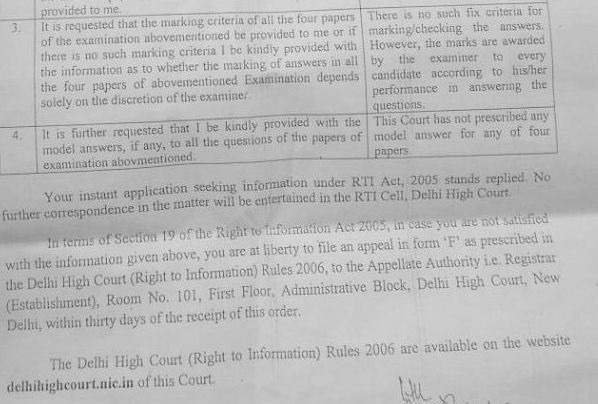
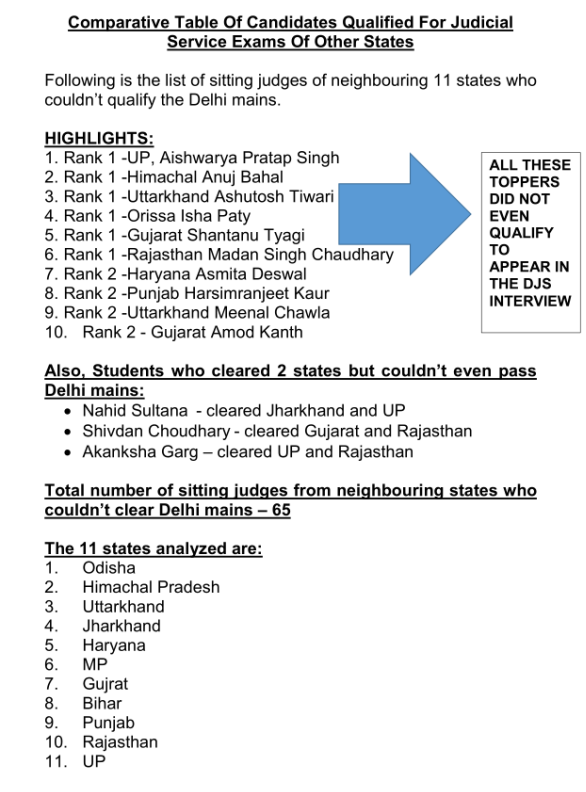
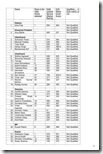
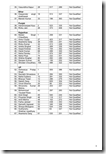
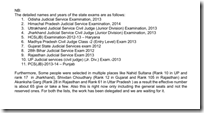
threads most popular
thread most upvoted
comment newest
first oldest
first
1. Release answers to objective questions after one year(when the final results are declared)so that chances of writ over ridiculous answers be completely avoided.
2. Marks of candidates must only be released good 15-30 days after declaration of final results so that you can further delay any challenge.
3. Don't ever show copies to students, stonewall every god damn RTI.
This is how you retain your prestige. Lesson from UPSC hence is mandatory.
Clearly, these colleagues need an introduction to legal reasoning; or are direct or oblique beneficiaries of this mismanaged & unfortunate examination system.
Any lawyer with an unbiased view knows that the Delhi HC must be held accountable for your, mine, and its own sake.
1. Are there prima facie grounds to challenge the examination result? Yes.
There are prima facie grounds for re-evaluation. An lawyer who cannot see that has wasted their time and effort pursuing legal education. For Christ's sake, the answer-sheets had the candidates' names on them; the marking was wildly subjective with no marking parameters; there is no justification for the 'manipulation' of the qualifying mark 'cut-off' to limit the candidates to an unnaturally low number - the DHC CJ has also been unable to defend the examination.
Who have supported a call for this result to be examined? Union Law Minister. Senior Advocates. 650 candidates who studied for year(s) and cleared a preliminary examination to only earn the right to write this examination.
2. Is this issue of urgent priority? Yes.
There is a declared vacancy of over 500 positions - yes, read that number again. The DHC announced that it will fill 80. Then, they delayed the declaration of result by 6 months, and practically said - we changed our mind.
How will this impact the quality of our judges? Will good candidates amongst us want to write this exam? Will we manage to have the best and the brightest write this exam, or are we going to surrender the responsibility, integrity and prestige of these positions to whoever is willing to take a gamble on an unreliable selection process even if they are not the best and the brightest who can contribute on the whole to our legal system and society?
3. Do I think the allegations will result in action? Yes.
The integrity of the court is in question. Have our learned judges forgotten amongst the most fundamental of principles which must govern their actions -
“It is not merely of some importance, but is of fundamental importance that justice should not only be done, but should manifestly and undoubtedly be seen to be done”.
With this controversy making headlines, and sufficient doubt having been cast on the court's integrity in conducting the exam, I feel it is not only preferable but rather imperative that a fair and transparent re-evaluation be commissioned at the earliest to either grant relief to the affected students, or to uphold the current result. In neither of those circumstances does the court 'lose'.
On maintaining status quo, we all lose.
If only CLAT had taken the path trodden by UPSC! Thank god we have NLU-D for that!!
Mr. Kian show the other side also...
Because if one is capable of doing manipulation in checking then definitely and easily could do so in prelims.
These kind of arguments are not new. Same kind of arguments were advanced when MP mains result came a few years back, result is known to everyone.
Instead of creating controversy through specious arguments, if the whole examination process would have challenged then it could have made some sense.
Also if Delhi is at par with other judiciary examinations (assuming one selected in other should also get selected in Delhi) then why these sitting judges want to enter Delhi judiciary by leaving other.
In my opinion the whole examination process must be conducted by UPSC (Delhi don't have state PSC) like specialised body instead of Delhi High Court due to delays ranging upto four years. There are already too many cases pending, it is not the job of court to conduct such examinations for which it is also not specialised. Registry itself has shortage of staff, and the way the candidates are increasing i see sooner than later it being delegated to such specialised body. Though interview could be conducted by sitting judges for analysing acumen of the candidates.
Delhi High Court is certainly answerable but not for selecting other judiciary's sitting judges but rather for delays in the whole process which ought to have been conducted twice a year.
I meant to say very clearly that High Court is incapable of conducting the exam with rising number of candidates and this is visible through:
1. Delays ranging upto 4 years.
2. Shortage of staff.
3. Its not specialised body for conducting exams, at such level where number of candidates are rising and the exam process consists of three barriers.
Regarding your point of past exams and the merit be selected into them, its a straw man argument. I would rather won't waste my time on that.
Pray . . . how can you defame an anonymous person?
threads most popular
thread most upvoted
comment newest
first oldest
first